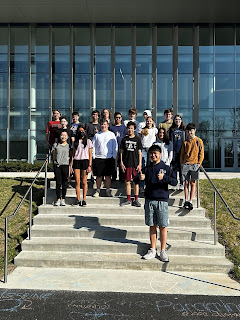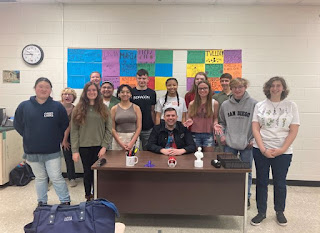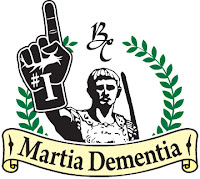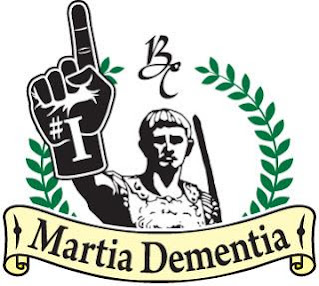More wired than a Roman Internet café
Students and teachers of Latin, ancient Greek, and Classical literature can exchange ideas on the role of technology in the Classics classroom here. Share your stories and ideas, Titus-like triumphs, or Trojan-like defeats with colleagues world-wide.
Forum
Nutting's 'Ad Alpes' Latin Audiobook
Ad Alpes: a Tale of Roman Life is a Latin reader for intermediate students.It was originally published in 1923. The story is held together by the narrative conceit of a journey from Ephesus in Asia Minor, where the father, Publius Cornelius, had…Continue
Started by Latinum Institute Jul 2, 2020.
The Vulgate Psalms in Classical Audio
https://www.patreon.com/latinumNew at Latinum: the Vulgate Psalms in classical audio are now complete. I have also started working on recording versions of…Continue
Started by Latinum Institute Jul 18, 2017.
Statues of Greek Gods Unearthed in Crete
Source: http://news.discovery.com/history/archaeology/statues-of-greek-gods-unearthed-in-crete-160127.htmStatues of Greek Gods Unearthed…Continue
Started by Connor Hart Jan 28, 2016.
Hey Archaeologists: Caryatids at Amphipolis (More Links at Bottom) 10 Replies
Figurines From Ancient Greek Tomb Called Major DiscoveryArchaeologists inspect a female figurine in a hall leading to an unexplored main room of an ancient tomb, in the town of Amphipolis, northern Greece, released by the Greek Culture Ministry,…Continue
Started by Connor Hart. Last reply by Connor Hart Oct 2, 2015.
Groups
-
New York Classics Enthus…
2 members
-
Analysis and Grammar in …
3 members
-
Using Video Conferencing…
4 members
-
Greek and Latin Literatu…
13 members
-
CORPORATIO PRO EXPLANATA…
3 members
Blog Posts
Latinum Institute Website Update
The Latinum Institutehas rebuilt its website, making it far easier for students to find the materials in our ever growing catalogue.…
ContinuePosted by Latinum Institute on July 2, 2020 at 12:04pm
How To Cultivate An Indoor Organic Garden
It is assumed that those who consider buying their groceries on the web are lazy certainly not wish to go out of the house, away from their computer. This is often a misguided notion. Online food delivery is really a boon for the running class…
ContinuePosted by Charlie Griffiths on March 12, 2018 at 10:49am
The Vulgate Psalms in Classical Audio
https://www.patreon.com/latinum
New at Latinum: the Vulgate Psalms in classical audio are now complete. I have also started working on recording…
Posted by Latinum Institute on July 18, 2017 at 1:55pm
Latinum is now on Patreon
The internet keeps mutating, and Classical life online needs to change as well. Latinum is now on Patreon.
The Latinum Podcast, which used to be hosted on mypodcast.com, has…
ContinuePosted by Latinum Institute on April 22, 2017 at 6:17pm
spoken latin
hi eclassics
i am a latin learner (11 years)i would like to speak the language a bit more.i find adler interesting but difficult to manage on your own.i have been working through orberg (lingua latina) for the last 8 years, ideally i would…
Posted by dan lane on November 13, 2016 at 3:55pm
De Schola apud SKYPE
Posted by Latinum Institute on January 8, 2016 at 5:46pm
Ιστορική προφορά Someone else?
Posted by santi on October 5, 2015 at 9:37am
Schola
As the internet has changed markedly since I first opened Schola on NIng, and again on social-go, after Ning hiked their prices to make continuing unviable, I have decided the time has come to close Schola down - people now have whatsapp groups…
ContinuePosted by Latinum Institute on August 25, 2015 at 4:39pm
Rogue Classicism
This is a test post
Having recovered from a stroke in October, I’m hoping to resume blogging if possibleThelxinoe ~ Classics News for October 30, 2023
Hodie est a.d. III Kal. Nov. 2776 AUC ~ 16 Pyanepsion in the third year of the 700th Olympiad In the News Depiction of Trojan War hero Ajax found in 1,800-year-old submerged building in Greece | Live Science Cristiano Ronaldo, Lionel Messi and Kylian Mbappe move over! Meet the Roman athlete who’s ‘£15BILLION fortune’ eclipses … Continue reading Thelxinoe ~ Classics News for October 30, 2023Thelxinoe ~ Classics News for October 28, 2023
Hodie est a.d. V Kal. Nov. 2776 AUC ~ 14 Pyanepsion in the third year of the 700th Olympiad In the News Cicero cleared at Supreme Court of murdering five opponents in 2,086 year old case Depiction of Trojan War hero Ajax found in 1,800-year-old submerged building in Greece | Live Science In Case You … Continue reading Thelxinoe ~ Classics News for October 28, 2023Latinblogg
Your Near-Daily Dose of Greek
Ομαδική έκθεση βιβλίου τοπικών συγγραφέων & ποιητών στο Δήμο Κορδελιού Ευόσμου (21/4/2024)
Ο Δήμος Κορδελιού Ευόσμου δια της Αντιδημαρχίας Παιδείας, Σχολικής Στέγης, Προσχολικής Αγωγής, Δραστηριοτήτων και συνεργασία με τις δύο Δημοτικές Βιβλιοθήκες Ευόσμου και Ελευθερίου Κορδελιού, αναλαμβάνει την πρωτοβουλία ανάδειξης και προβολής των τοπικών συγγραφέων και ποιητών, οργανώνοντας για πρώτη φορά μια ομαδική έκθεση βιβλίου προς τιμή τους. Η ομαδική Έκθεση οργανώνεται με αφορμή την Παγκόσμια Ημέρα Βιβλίου& Πνευματικών Δικαιωμάτων, η οποία έχει καθιερωθεί διεθνώς από τον Εκπαιδευτικό, Επιστημονικό και Πολιτιστικό Οργανισμό των Ηνωμένων Εθνών– UNESCO.Φεστιβάλ Παιδικού και Εφηβικού Βιβλίου Γιορτή Βιβλίου στην Achaia Clauss, Πάτρα (20-24/4/2024)
Το Πολύεδρο, οργανώνει και φέτος στην Πάτρα για 28η χρονιά, το Φεστιβάλ Παιδικού και Εφηβικού Βιβλίου, από 20 μέχρι 24 Απριλίου, συνδυάζοντας την Παγκόσμια Ημέρα Παιδικού Βιβλίου (2 Απριλίου), με την Παγκόσμια Ημέρα Βιβλίου (23 Απριλίου). Στη διάρκεια του Φεστιβάλ έχουν προγραμματιστεί πολλές εκδηλώσεις με συγγραφείς παιδικών βιβλίων, εικονογράφους, άλλους επαγγελματίες του βιβλίου και εκπαιδευτικούς, στο Πολύεδρο και στην Achaia Clauss. Η έναρξη του Φεστιβάλ είναι το Σάββατο 11 το πρωί στο Πολύεδρο, με διάφορες δράσεις για την ''προετοιμασία της Γιορτής'' και τα παιδιά να ξεκινούν να δημιουργούν το ''Βιβλίο των βιβλίων''. Δευτέρα μέχρι Τετάρτη στον χώρο του Πολύεδρου θα υπάρχει έκθεση παιδικού και εφηβικού βιβλίου και θα γίνονται εκπαιδευτικές δράσεις με ανθρώπους από το χώρο του βιβλίου (γραφίστας, τυπογράφος, συγγραφείς κ.τ.λ.) για σχολικές ομάδες,Διάλεξη του κ. Octavian Gordon με τίτλο: ''Βυζαντινές πνευματικές αντιλήψεις στους Λατίνους συγγραφείς: η περίπτωση του Γρηγορίου Μεγάλου'', Παν/μιο Ιωαννίνων (18/4/2024)
Την Πέμπτη 18 Απριλίου 2024 και ώρα 19.15 θα πραγματοποιηθεί διάλεξη του κ. Octavian Gordon ( Επίκ. Καθ. Πανεπιστημίου του Βουκουρεστίου) με τίτλο: ''Βυζαντινές πνευματικές αντιλήψεις στους Λατίνους συγγραφείς: η περίπτωση του Γρηγορίου Μεγάλου''. Η διάλεξη θα γίνει στα Αγγλικά στην αίθουσα του Τομέα Αρχαίας και Μεσαιωνικής Ιστορίας του Τμήματος Ιστορίας και Αρχαιολογίας (Φιλοσοφική Σχολή, 1ος όροφος).Εκδήλωση: ''Δέκα Χρόνια Διεθνές Θερινό Πανεπιστήμιο'', Μουσείο Κανελλοπούλου, Πλάκα (26/4/2024)
Την Παρασκευή 26 Απριλίου στις 12 το μεσημέρι, θα πραγματοποιηθεί στο Μουσείο Κανελλοπούλου (οδός Θεωρίας 12) εκδήλωση παρουσίασης του 10ου Διεθνούς Θερινού Πανεπιστημίου, που οργανώνεται από το Εργαστήριο Μελέτης Κοινωνικών Θεμάτων, ΜΜΕ και Εκπαίδευσης του Παιδαγωγικού Τμήματος Νηπιαγωγών της Σχολής Επιστημών Αγωγής του Πανεπιστημίου Ιωαννίνων, σε συνεργασία με το Maliotis Cultural Center του Hellenic College Holy Cross και την American Hellenic Educational Progressive Association (ΑΧΕΠΑ Αμερικής). Το πρόγραμμα τελεί υπό την αιγίδα και με τη στήριξη της Γενικής Γραμματείας Απόδημου Ελληνισμού και Δημόσιας Διπλωματίας του Υπουργείου Εξωτερικών. Το 10ο Διεθνές Θερινό Πανεπιστήμιο αφιερώνεται φέτος στη διάδοση και διδασκαλία της ελληνικής γλώσσας στην ομογένεια της Αμερικής. Θα μιλήσουν οι κ.κ. Προκόπιος Παυλόπουλος, τ. Πρόεδρος της Δημοκρατίας, Τακτικό Μέλος Ακαδημίας Αθηνών, Ιωάννης Χρυσουλάκης, Γενικός Γραμματέας Απόδημου Ελληνισμού και Δημόσιας Διπλωματίας Υπουργείου Εξωτερικών, Άννα Κ. Μπατιστάτου, Πρύτανης Πανεπιστημίου Ιωαννίνων, Kαθηγήτρια Τμήματος Ιατρικής Σχολής Επιστημών Υγείας, Νίκος Ξυδάκης, πρ. Υπουργός Πολιτισμού και Αν. Υπουργός Εξωτερικών, και η Νικολέττα Τσιτσανούδη-Μαλλίδη, Ιδρύτρια/ Διευθύντρια του Διεθνούς Θερινού Πανεπιστημίου, Καθηγήτρια Παιδαγωγικού Τμήματος Νηπιαγωγών Σχολής Επιστημών Αγωγής Πανεπιστημίου Ιωαννίνων. Την εκδήλωση θα συντονίσει η κ. Νατάσσα Σπαγαδώρου, Δημοσιογράφος CNN Greece.Σειρά διαδικτυακών ομιλιών με τίτλο "Ιστορίες από τα αρχεία" στο ΑΠΘ: Κ. Τικτοπούλου, Τα σολωμικά χειρόγραφα και ο εκτεταμένος/εκτενής συγγραφικός νους (25/4/24)
Την Πέμπτη 25 Απριλίου 2024, στις 19.15, η αναπληρώτρια καθηγήτρια Νεοελληνικής Φιλολογίας στο Τμήμα Φιλολογίας του ΑΠΘ κ. Κατερίνα Τικτοπούλου θα μιλήσει με θέμα: «Τα σολωμικά χειρόγραφα και ο εκτεταμένος/εκτενής συγγραφικός νους». Τα χειρόγραφα εργασίας ενός λογοτέχνη μπορούν να δώσουν ασφαλείς απαντήσεις στο διαχρονικό φιλολογικό αίτημα της “αυθεντικότητας” καθώς και στο νεότερο ζητούμενο να γίνει κατανοητή η πολύπλοκη δημιουργική διαδικασία σύνθεσης των έργων. Για τη μελέτη της δημιουργικής διαδικασίας της γραφής, η υλικότητα έχει σημασία. Δεν χρειάζεται να επιχειρηματολογήσει κανείς πολύ υπέρ αυτού του ισχυρισμού. Είναι γνωστό ότι στοιχεία όπως το χρώμα και η υφή του χαρτιού, οι αποχρώσεις του μελανιού, το πάχος της πένας ή του μολυβιού, η ένταση με την οποία ακουμπούσαν στο χαρτί, η ταχύτητα με την οποία αναπτύχθηκε η γραφή, η θέση και η κατεύθυνσή της παρέχουν πληροφορίες για την ανασυγκρότηση της χρονικότητας της γραφής με τρόπο που δεν μπορούν από μόνες τους οι λέξεις που βρίσκονται στην ίδια επιφάνεια. Υπάρχει όμως κάποια αλληλεπίδραση ανάμεσα στην υλικότητα των χειρογράφων και τον τρόπο εργασίας και σκέψης του δημιουργού; Η απάντηση φαίνεται να είναι θετική ιδίως αν συμφωνήσουμε ότι τα χειρόγραφα αποτελούν αναπόσπαστο μέρος του εκτεταμένου νου, όπως υποστηρίζουν νεότερες γνωσιακές θεωρίες. Στόχος της ομιλίας είναι μια διεπιστημονική προσέγγιση των σολωμικών χειρογράφων στην περιοχή των γνωσιακών ανθρωπιστικών σπουδών (cognitive humanities), συνδυάζοντας τη θεωρία του εκτεταμένου ή εκτενούς ή ενδρασιακού νου (extended/extensive/enactive mind) με τις λίγο-πολύ οικείες οπτικές της μελέτης της δημιουργικής διαδικασίας σύνθεσης που έχουν εισαγάγει στην Ελλάδα, για την περίπτωση του Σολωμού, η αναλυτική μέθοδος και διεθνώς η γενετική κριτική. Το πρώτο μέρος της ομιλίας επιχειρεί μια σύντομη παρουσίαση της γνωσιακής θεωρίας του εκτεταμένου νου και το δεύτερο μέρος εστιάζει στα σολωμικά χειρόγραφα ως αναπόσπαστο μέρος του εκτεταμένου συγγραφικού νου –εν προκειμένω του σολωμικού συγγραφικού νου– υποστηρίζοντας ότι όψεις της υλικότητας των χειρογράφων μπορούν να συνδεθούν με την ποιητική του συγγραφέα.Pompeiiana Newsleter
Pompeiiana IX.7, March 1983
Content:A Farewell Message from Pompeiiana Newsletter, Then and Now
It is not without some sadness that the Pompeiiana Newsletter blog project comes to a close. I have, for the better part of the past 13 months, posted five issues per week of Dr. Bernard Barcio's labor of love, his Pompeiiana Newsletter, which ran from 1974 until the end of the 2002-2003 school year. It is my hope that Latin teachers, students, and enthusiasts, will continue to return to thisPhotos
Latinum has moved!
Omnes,
Due to the recent struggles with MyPodcast, our own Molendinarius has moved his Latinum site to http://latinum.org.uk. This change has been reflected in our links section as well. Please check this out, it's a very useful site.
Remember, if you have something that you would like to share with the members here, please send me a message and you can be a "guest" poster.
Pax,
Matthew Paul-Frank Duran
eClassics Administrator
Latest Activity
Nutting's 'Ad Alpes' Latin Audiobook
BC Latin Blog
Martia Dementia 2024
To the victor—whoever finishes with the best bracket—belong the spoils. Before getting to the prizes, here is how the competition will work. Please read through the process carefully. For reference, we are providing a PDF of the bracket that you can use with your classes, but be sure to submit your final choices via the online system.
The Bracket
Starting today, complete and submit a bracket to be eligible for wondrous prizes. Please access and submit your bracket online via the following link: Martia Dementia 2024 Bracket.When you access the online Martia Dementia bracket, click the “Submit your bracket!” button to start making your selections. You will be prompted to enter your name and email address; we need this information so that we can track and notify the winners of the competition once Martia Dementia is completed. After signing up, you will be asked to predict a winner for each game in the bracket.
At the bottom of this post, you will find a link to a PDF showing short descriptions of each of this year’s Martia Dementia participants. You can access the same descriptions by clicking on the photo of a given figure in the bracket.
Once you have completed all of your selections and have submitted your bracket, you will receive a notice thanking you for your submission.
If you would like to view your prediction bracket, simply click on the link to “View My Prediction.” We recommend saving a copy of your bracket at this point so that you can keep track of how you are doing as the competition progresses. With our online submission system, you can also easily share your prediction bracket via email or social media—a great way to show off how you’re doing, or earn some pity points if your bracket is going poorly.
We are also providing a PDF copy of the bracket here (for reference only) in case you would like to print a copy of the bracket and fill one in with your class. However, we are not accepting scanned brackets, so make sure that you also submit the bracket online.
Brackets will be accepted through Wednesday, March 20.
The Survey
A voting survey will be made available on Thursday, March 21, where you can vote for your picks. Whichever figures have the most votes by the time the survey closes will advance through the round. Actively participating in the survey betters your chances at winning. We will announce via social media when voting for each round has opened.We cannot stress enough the importance of voting. When the survey goes live, cast your votes! Get your friends to vote for your picks. Teachers, get your students to stuff the survey with favorable votes!
Victori Spolia
This competition is not solely for bringing glory to your favorite ancient writer or bird. Bolchazy-Carducci Publishers is offering book prizes for the brackets that most closely resemble the final results; a $100 book credit will be awarded to the first-place participant, a $50 credit to the second-place participant, and a $25 credit to the third-place participant. Feeling like you no longer stand a chance? Do not give up! There will also be a $25 credit for having the most abysmal bracket!Stay Connected
Be sure to bookmark this post for future reference. Also, follow us on Facebook for updates as the competition progresses.Remember, brackets close March 20, and the first round of voting will begin March 21.
Bracket and Other Resources
- Access the online bracket
- Access a printable bracket (for reference only)
- Access a description of all Martia Dementia 2024 figures
Voting Schedule
- Round 1: March 21–22
- Round 2: March 23–26
- Round 3 (Sweet 16): March 28–29
- Quarterfinals (Elite 8): March 30–April 2
- Semifinals (Final 4): April 3–5
- Final (Championship): April 6–9
Cerberus Wins: Martia Dementia 2023 Recap
 |
| Magistra Farkas's winning class. |
Once again, thank you to all participants, who helped make this year’s contest a resounding success. Have strong feelings about this year’s winners? Hope to see a particular ancient figure featured in next year’s contest? Tweet @BCPublishers what and who you would like to see and include the hashtag #MartiaDementia or give feedback in the comments below. We would love to hear from you!
 |
| Winner Derek Sanders and some of his students. |
Martia Dementia 2023
After eight years of spring campaigns—in which gods, monsters, birds, authors, and military commanders struggled on the Martia Dementia battle field—we’re back, with the ninth annual contest! Last year, some bloodthirsty birds defeated a slew of ancient authors, with the poisonous ducks of Pontus gaining victory over Rome’s sacred chickens. In 2023, mythical monsters are back, and ready to take on a new set of rivals, gods and goddesses. In keeping with the theme of the 2022–2023 Roman Calendar, these Martia Dementia competitors represent the non-Olympians, those deities that might personify important concepts, inspire daily worship, or offer divine revelation through initiation into their mysteries.
See the downloadable, printable PDF of the Roman Calendar here, showcasing artwork and imagery associated with twelve of this year’s Martia Dementia participants. For a variety of mythical monster activities, scroll to the bottom of our Distance Learning page to find an online matching game, printable templates to create a Guess Who?–style board game, and more.
To the victor—whoever finishes with the best bracket—belong the spoils. Before getting to the prizes, here is how the competition will work. Please read through the process carefully. For reference, we are providing a PDF of the bracket that you can use with your classes, but be sure to submit your final choices via the online system.
The Bracket
Starting today, complete and submit a bracket to be eligible for wondrous prizes. Please access and submit your bracket online via the following link: Martia Dementia 2023 Bracket. You can also find the bracket at the bottom of this blog post.
When you access the online Martia Dementia bracket, click the “Submit your bracket!” button to start making your selections. You will be prompted to enter your name and email address; we need this information so that we can track and notify the winners of the competition once Martia Dementia is completed. After signing up, you will be asked to predict a winner for each game in the bracket.
 |
For each round, you view a set of contestants that will "face off" against one another. Predict and select your winner for each "contest" in the bracket.
|
At the bottom of this post, you will find a link to a PDF showing short descriptions of each of this year’s Martia Dementia participants. You can access the same descriptions by clicking on the photo of a given figure in the bracket.
 |
| Clicking on a god or monster will bring up a short description. |
We are also providing a PDF copy of the bracket here (for reference only) in case you would like to print a copy of the bracket and fill one in with your class. However, we are not accepting scanned brackets, so make sure that you also submit the bracket online.
Brackets will be accepted through Wednesday, March 15 (the Ides of March!).
The Survey
A voting survey will be made available on Thursday, March 16, where you can vote for your picks. Whichever figures have the most votes by the time the survey closes will advance through the round. Actively participating in the survey betters your chances at winning. We will announce via social media when voting for each round has opened.
We cannot stress enough the importance of voting. When the survey goes live, cast your votes! Get your friends to vote for your picks. Teachers, get your students to stuff the survey with favorable votes!
Victori Spolia
This competition is not solely for bringing glory to your favorite ancient writer or bird. Bolchazy-Carducci Publishers is offering book prizes for the brackets that most closely resemble the final results; a $100 book credit will be awarded to the first-place participant, a $50 credit to the second-place participant, and a $25 credit to the third-place participant. Feeling like you no longer stand a chance? Do not give up! There will also be a $25 credit for having the most abysmal bracket!
Stay Connected
Be sure to bookmark this post and check back here to access the link to the voting bracket. Also, follow us on Facebook and Twitter for updates as the competition progresses.
Remember, brackets close March 15, and the first round of voting will begin March 16.
Bracket and Other Resources
Access a printable bracket (for reference only)
Access a description of all Martia Dementia 2023 figures
Voting Schedule:
· Round 1: March 16–17
· Round 2: March 18–21
· Round 3 (Sweet 16): March 23–24
· Quarterfinals (Elite 8): March 25–28
· Semifinals (Final 4): March 30–31
· Final (Championship): April 1–4
Note that each round of voting will open at 7:30 a.m. central time and close at 4:00 p.m. central time on the designated days.
Poisonous Ducks Win: Martia Dementia 2022 Recap
Martia Dementia 2022 featured a fierce competition, pitting humans against avian foes. Our ancient author field covered writers from Athens to Rome and beyond, some quite archaic (Homer, Sappho), and some relatively more modern (Perpetua, Augustine). Whether poets, historians, playwrights, or philosophers, these writers wielded their all-mighty pens—styli?—against mythological winged creatures, ominous raptors, domestic fowl of note, and more.
 |
| The championship was hotly contested by the sacred chickens of Rome and the poisonous ducks of Pontus. |
Round one saw the advancement of Homer, easily defeating the eagle of Zeus, then later the ossifragus, the bonebreaker bird. While comic Plautus and saintly poet Aelia Eudocia fell out of the competition early on, Menander rallied against the ostrich, known to the ancients as the sparrow-camel. Apollonius of Rhodes failed in his foray against the famed harpies, whom he had described attacking the Argonauts in his own epic. Meanwhile, Seneca the Younger could not repel the sacred chickens of Rome, who proved blessed by the gods. Roman poets Vergil, Lucretius, and Ovid did quite well, however, as did several historians and the mathematician and scientist Perpetua.
Poets continued to hold their own against birds large and small: Homer was able to overtake the sirens, the bird-women of the Odyssey, before matching up with (and winning against) Catullus. Vergil, who handily beat last year’s champion, the phoenix, continued into round three—where the powerful pulli, the sacred chickens, were too formidable. Of all the authors, Ovid came the closest to winning the contest, but in the semifinals, he succumbed to King Mithridates’s poisonous ducks. The final battle in the championship round was bird vs. bird, as the sacred chickens of Rome fought the poisonous ducks of Pontus beak and nail. While Rome famously defeated Pontus, the same was not true of each respective state’s representative birds. The poisonous ducks brought down the sacred chickens, reigning victorious in Martia Dementia 2022! If you'd like to see the full bracket results, you can access them here.
Once again, thank you to all participants, who helped make this year’s contest a resounding success. Have strong feelings about this year’s winners? Hope to see a particular ancient figure featured in next year’s contest? Tweet @BCPublishers what and who you would like to see and include the hashtag #MartiaDementia or give feedback in the comments below. We would love to hear from you!
Martia Dementia 2022
The snows have fled, now the grass returns to the fields
and the leaves to the trees. (Horace, 4.7.1–2)
As we emerge from the cold, snowy days of winter, we not only encounter the greenery and renewal that springtime heralds: we also embark on our yearly Martia Dementia celebrations, now in their eighth year! In 2021, the best military commanders of the ancient world met their match in competition with birds. Shockingly, the birds emerged triumphant, and the immortal phoenix took (and perhaps burned to ashes) the laurel wreath. This year, the birds are back and ready to flaunt their fearlessness. Their challengers? Ancient Greek and Roman writers, in part inspired by our newest Explore Latin reader on theater and comedy! In Explore Latin: Lūdī Scaenicī by Christopher Bungard, information is presented about playwrights and poets like Menander, Livius Andronicus, Ennius, Plautus, and Terence. These authors, and many more, will now have to prove their Martia Dementia mettle.
To the victor—whoever finishes with the best bracket—belong the spoils. Before getting to the prizes, here is how the competition will work. Please read through the process carefully: this year we will continue to use an online bracket and voting system. For reference, we are providing a PDF of the bracket that you can use with your classes, but be sure to submit your final choices via the online system.
The Bracket
Starting today, complete and submit a bracket to be eligible for wondrous prizes. Please access and submit your bracket online via the following link: Martia Dementia 2022 Bracket.
When you access the online Martia Dementia bracket, click the “Submit your bracket!” button to start making your selections. You will be prompted to enter your name and email address; we need this information so that we can track and notify the winners of the competition once Martia Dementia is completed. After signing up, you will be asked to predict a winner for each game in the bracket.
Once you have completed all of your selections and have submitted your bracket, you will receive a notice thanking you for your submission:
If you would like to view your prediction bracket, simply click on the link to “View My Prediction.” We recommend saving a copy of your bracket at this point so that you can keep track of how you are doing as the competition progresses. With our online submission system, you can also easily share your prediction bracket via email or social media—a great way to show off how you’re doing, or earn some pity points if your bracket is going poorly.
We are also providing a PDF copy of the bracket here (for reference only) in case you would like to print a copy of the bracket and fill one in with your class. However, we are not accepting scanned brackets this year, so make sure that you also submit the bracket online.
Brackets will be accepted through March 16.
The Survey
A voting survey will be made available on March 17, where you can vote for your picks. Whichever figures have the most votes by the time the survey closes will advance through the round. Actively participating in the survey betters your chances at winning. We will announce via social media when voting for each round has opened.
We cannot stress enough the importance of voting. When the survey goes live, cast your votes! Get your friends to vote for your picks. Teachers, get your students to stuff the survey with favorable votes!
Victori Spolia
This competition is not solely for bringing glory to your favorite ancient writer or bird. Bolchazy-Carducci Publishers is offering book prizes for the brackets that most closely resemble the final results; a $100 book credit will be awarded to the first-place participant, a $50 credit to the second-place participant, and a $25 credit to the third-place participant. Feeling like you no longer stand a chance? Do not give up! There will also be a $25 credit for having the most abysmal bracket!
Stay Connected
Be sure to bookmark this post and check back here to access the link to the voting bracket. Also, follow us on Facebook and Twitter for updates as the competition progresses.
Remember, brackets close March 16, and the first round of voting will begin March 17.
Bracket and Other Resources
Access the online bracket
Access a printable bracket (for reference only)
Access a description of all Martia Dementia 2022 figures
Access a short explainer on submitting a bracket
Voting Schedule
- Round 1: March 17–18
- Round 2: March 19–22
- Round 3 (Sweet 16): March 24–25
- Quarterfinals (Elite 8): March 26–29
- Semifinals (Final 4): March 31–April 1
- Final (Championship): April 4–6
Note that each round of voting will open at 7:30 a.m. central time and close at 4:00 p.m. central time on the designated days.
© 2024 Created by Andrew Reinhard.
Powered by
![]()









